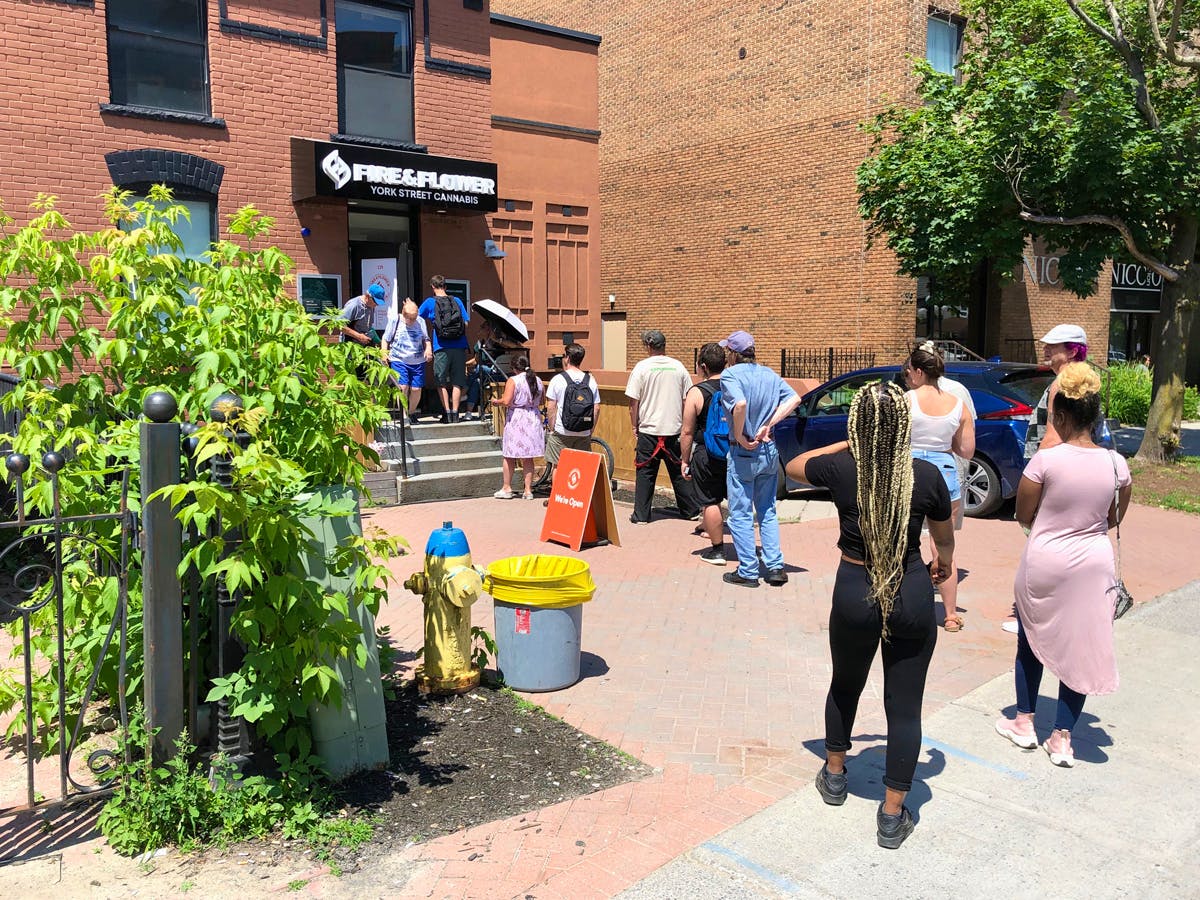There is no obvious shortage of parking on the main street through Smiths Falls, Ontario. The boulevard is 60 feet wide, with angled spaces on either side, most of which are empty at 3.30pm on this particular Wednesday afternoon. And yet the town council’s plan – to repaint the white lines so they run parallel with the sidewalk – is the hot button political issue here. It’s raised by several people during my visit; two taxi drivers and the town’s deputy mayor.
That’s remarkable when you consider what’s going on a mile further down the road. The cultivation, processing and selling of cannabis on an industrial scale, the apparatus of one of the largest legal drug trafficking operations in the world. The row over parking provision has been rumbling since February.

Five years ago it looked as though Smiths Falls’s best days were behind it. Several major employers had packed up and left, taking hundreds of jobs with them. The loss of Hershey’s chocolate factory was a particularly hard blow, depriving the town of its main tourist attraction. And part of its identity too – the company’s logo was painted on the side of Smiths Falls’s most prominent feature, its 100-year old water tower.
By all accounts things are very different now. The Hershey building is occupied again, by Canopy Growth and its gamesome CEO, Bruce Linton. Dressed in his white lab coat, it’s immediately apparent why he’s been dubbed the ‘Willy Wonka of weed’. Incidentally, edibles will become legal in Canada later this year, allowing the company to sell cannabinoids in many novel forms, including gummy bears, chocolate bars and soft drinks.

When the guided tour is about to start his phone rings and, as if the call was scripted for PR purposes, Martha Stewart is on the other end of the line. ‘Sorry Martha, I have to go, I’m with some journalists from England!’ he says, before apologizing and pulling on a pair of blue shoe covers. Stewart is – prison sentence notwithstanding – the personification of prosperous suburban America. Her products are a fixture on the shelves of department stores and supermarkets across the country. She joined Canopy as an adviser earlier this year. Her endorsement underlines just how mundane the drug has become, on this side of the Atlantic at least.
Canopy’s HQ, with its wide open foyer and canteen-cum-games room, is more Silicon Valley than rural Ontario. Its margins are similarly in the realm of tech start-ups, where profitability is an afterthought. There’s a higher purpose here. Looking at Canopy’s future plans and recent acquisitions, one might be tempted to conclude that its goal is total domination of the global cannabis market.
If that vision is to be realized things are going to have to change. In Britain regulation seems like a distant prospect. The few patients that have been given cannabis prescriptions had to fight hard for them, baring their lives to the media to make their case. Canopy recently launched Spectrum Therapeutics UK, which, initially at least, aims to educate physicians on cannabinoid-based medicine, to provide guidance on when it’s appropriate to prescribe and the legal avenues for doing so.
Recreational use is an even less popular cause, with only a handful of politicians publicly in favor. I asked Linton how he plans to change that. ‘What we try to do is get regulators to accept an invitation from Health Canada to come and meet with us here, to see the facility. We explain what it is we’re doing, and typically they’ll leave saying “I feel a lot more comfortable now”. But you’ve got to get them to see it. Until they do people have a whole bunch of ideas in their heads.’
The front page of Friday’s Telegraph would seem to confirm the argument Peter Hitchens has been making for years – that drug laws aren’t being enforced. Essentially we are free to buy and consume cannabis without any of the benefits of regulation; consistency, accountability and various other consumer protections. Ending prohibition would close this gap. The economic benefits of doing so are clearly demonstrated by Canopy’s unlikely presence in the little town of Smiths Falls.
Linton’s enthusiasm for the subject is infectious, and I have no doubt that the professionalism of his operation, and its potential to transform the fate of depressed towns, would change hearts and minds if more politicians saw it up close. In Smiths Falls house prices are up. New restaurants are opening. There’s a gastropub called Fort Hemlock that wouldn’t look out of place in Shoreditch or Dalston. Early investors in Canopy are cashing out, tens of thousands of dollars richer than they were before. There’s even an Uber driver now (just one – if you open the app you can watch him on his lonely journey). Almost every constituency in Britain has a town crying out for this sort of investment.
During conversations with Linton and his deputies a refrain emerges. They say the only people who lose out under the current system of regulation are the black market dealers. The following day I was able to test this hypothesis when, in Ottawa’s Confederation Park, I found a group of stoners hiding from the midday sun in the shade of a grove. ‘Are you guys local?’ I asked. ‘Why?’ came the instant reply from a young man with the build of a pop star’s bodyguard. I told them I was writing a story about Canopy and Smiths Falls. ‘Those guys are dirt, man. A couple years ago you could get a gram for five bucks. Now it’s 10, 15, 20. All over the fuckin’ place.’ He became more animated during the course of our conversation. ‘Why would you go to them anyway, when you can come to me? I’m not asking for your data, I’m not taking your biometrics, I’m your friendly neighborhood pot dealer just tryna make a living.’ Of the dozen or so men and two women in the group, not one had a positive word to say about regulation.

Across town the line to get inside Fire & Flower, a legal dispensary, snakes across the sidewalk. The people here appear to be more middle class (though somewhat paradoxically they pay less for their weed). Despite protests from the stoners in Confederation Park – ‘you have no idea what you’re buying from those guys!’ – you do, in fact, know exactly what you’re buying. THC and CBD content is strictly controlled and displayed clearly on every packet.
Data in the British Social Attitudes Survey suggests that in the UK we are still skeptical about the benefits of cannabis regulation. ‘There was, initially, opposition here too,’ Linton says. ‘It all evaporated after we opened up and people saw how good it was for the town. Now, if you go into Smiths Falls and say you’re against cannabis, I wish you luck getting out alive!’
The world is watching Canada, and companies like Canopy. If the new regulatory system is a success, brands like Tweed could become global players, as recognizable as Coke, Apple and Ford. It would be difficult to overstate the potential for growth in this emerging market. In most Western countries around 15 percent of the population smokes cannabis. Currently their needs are being served by paranoiacs hanging around on park benches.
This article was originally published on Spectator Life.
























